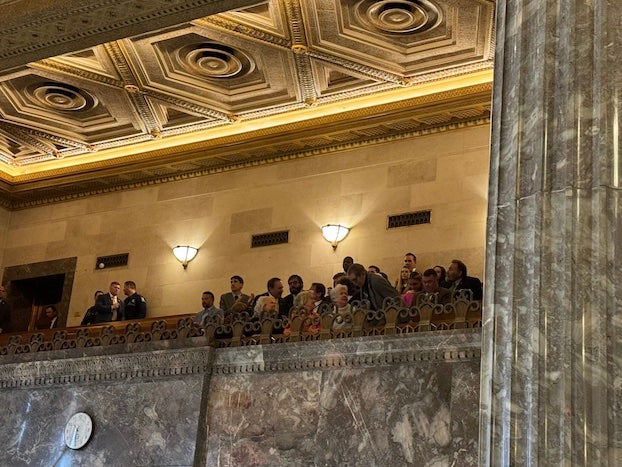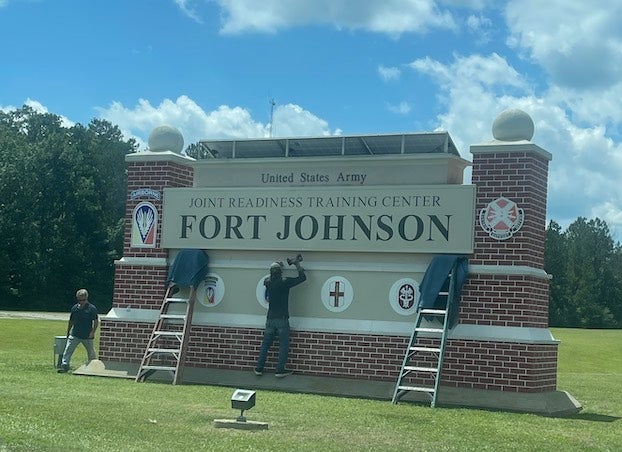Lawmakers give final passage to sweeping changes in crime laws
Published 6:19 pm Thursday, February 29, 2024

- Gov. Jeff Landry gathered with families of crime victims at the Capitol as the death penalty bill was passed. (Elizabeth White / LSU Manship School News Service)
By Elizabeth White and Piper Naudin | LSU Manship School News Service
Louisiana lawmakers gave final passage Thursday to sweeping changes in crime laws sought by Gov. Jeff Landry–including measures that will expand methods of
execution to include electrocution and nitrogen hypoxia and shield records relating to the executions.
Before the special session ended, legislators also had approved a host of other bills that would toughen the criminal justice system and roll back bipartisan changes in 2017 that were meant to lower the state’s incarceration rate and reduce prison costs.
The measures would allow adults to carry concealed firearms without permits and would mostly abolish parole for future crimes. They also would cut good-behavior sentence reductions to 15% from 65% and give judges more discretion in sanctioning people for parole violations. Other bills would increase penalties for carjacking and for distributing fentanyl and lower the age to be tried as an adult from 18 to 17. And some would make some court records available online for juveniles charged with crime and make it harder to sue police officers.
Landry, a Republican who took office in January, is expected to sign the bills next week. Thursday started with a solemn debate on the Senate floor, where the death penalty bill was passed back to the House with amendments. There has not been an execution in the state in 15 years, and 58 inmates are on death row.
“Through our proposed legislation, we intend to keep our word to the victims of these awful crimes and deliver the swift and certain justice that they were promised so long ago,” Sen. Caleb Kleinpeter, R-Port Allen, said.
Kleinpeter also proposed an amendment, which was adopted, requiring the state inspector general to conduct a review and certification of how drugs, medical supplies or medical equipment would be obtained for executions.
Sen. Royce Duplessis, D-New Orleans, offered an amendment to strike the use of nitrogen hypoxia due to its use during the Holocaust by Nazi Germany. The amendment was rejected. Some legislators spoke against the bill, citing religious and constitutional concerns as well as saying they were speaking on behalf of victim’s families who oppose the new methods.
“I’ve never personally believed that the death penalty honors victims, it honors vengeance,” Duplessis said. “The Bible teaches us that vengeance does not belong to us.” Sen. Gary Carter, D-New Orleans, called the bill unconstitutional on the basis that it falls under cruel and unusual punishment and said African Americans are more likely to be given a death penalty sentence.
“This is a bad bill. This is unconstitutional,” Carter said. “And if you can’t vote against it, I urge the federal courts, if you are listening, to strike this law down.”
Sen. Gerald Boudreaux, D-Lafayette, spoke on behalf of the Louisiana Conference of Catholic Bishops, asking his colleagues to consider that some families do not want executions because it violates their conscience.
“Killing the young man responsible for my mother’s death will not bring me or my family any closure,” Carter quoted the son of a woman whose killer has been on death row for more than 20 years. “Killing him will only bring into our lives, his family’s life and into our community more pain, more suffering, more anger, and more harm.”
Other legislators spoke in support of the bill, also citing religious and legal reasons as well as arguing for victims’s families in favor of the methods.
Senator Adam Bass, R-Bossier City, spoke about how some legislators have compared the death penalty to abortion and have used the Bible in opposition to the bill.
“It’s our sin that separates us from Holy God and an unborn child has committed none,” Bass said. “But the people who are on death row that we’re talking about have committed some of the most heinous crimes imaginable.”
Sen. Heather Cloud, R-Turkey Creek, said that despite the time she has spent visiting inmates on death row, she supported the bill because of the families of victims. She shared the story of a mother whose children were killed by their father who still sits on death row.
“The only consolation had that been me that I would have for not taking matters into my own hands would be the ultimate consequence found in the death penalty, found in the justice system,” Cloud said, referencing the mother. “It brings order to chaos and it’s necessary.”
The final debate Wednesday on the bill that would allow permit-less concealed carry for people 18 and older also was emotional.
Rep. Michael Johnson, R-Rapides, said there were not enough police officers to stop crime.
“People are fearful,” Johnson said. “They are afraid to leave their house. They are afraid to stay at their house.”
Rep. Denise Marcelle, D-Baton Rouge, argued, however, that police often interpret anyone with a gun as a threat.
“How would a law enforcement officer know when they show up to a scene whether someone is a criminal or not?” Marcelle asked.
Lawmakers from New Orleans sought unsuccessfully to carve out gun-free zones in the French Quarter and near the Superdome to help protect the city’s tourism industry.
Rep. Matthew Willard, D-New Orleans, worried about what would happen if a bystander were to be hit with a firearm by someone defending themselves. “Who would be liable?” he pondered.





